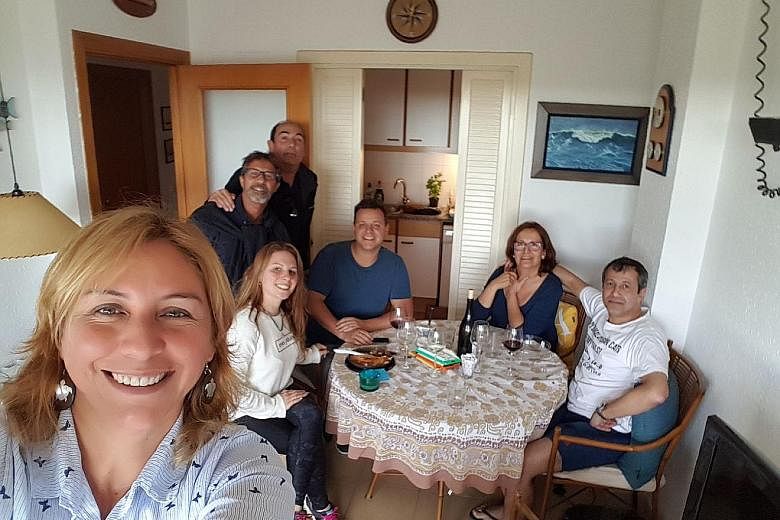When Catalonia's Parliament declared the province's independence from Spain in October, triggering a harsh response from Madrid, it also split teacher Carolina Rojo Mardones' family into two sides.
The 38-year-old Spanish teacher at Las Lilas, a Spanish language centre in Singapore, was opposed to the move for independence, as were her siblings and parents. But several younger members of her extended family in her home town of Barcelona - they keep in touch over WhatsApp - were not.
"My sister created a separate family WhatsApp group for those against independence," Ms Rojo, who has been living in Singapore for four years, told The Sunday Times.
"It made me very sad to see the violence that broke out in my home town," she said, referring to the police crackdown on voters and demonstrators during the referendum on Catalan independence, which the Spanish government said was against the law.
Ousted Catalan president Carles Puigdemont, the leader of October's botched referendum, is in self-imposed exile in Belgium.
Ms Rojo hoped last Thursday's vote in Catalonia to elect a new regional Parliament following the failed breakaway bid would help ease tensions.
But this does not seem likely.
Although pro-unity party Ciudadanos received the highest number of seats, the House majority now belongs to separatist parties, setting the stage for continued tensions.
"This is not the result I wanted as I do not want independence for Catalonia, but maybe it will help because now the government might have to listen to the independence parties more," said Ms Rojo, who said she would not discuss the result with her family.
Catalan Felix Bonet Nieto, 50, who is self-employed and has lived in Singapore since April last year, is also upset by the majority of pro-independence groups.
"The situation makes me very upset, even so far away. I have a friend from school who deleted me on Facebook because he is pro-independence and I am not," he said.
But not everyone among the estimated 2,000-plus Spanish citizens in Singapore opposes Catalan independence.
Those in favour often argue it is for cultural reasons, claiming the Catalan language and identity specific to the region are not fully expressed under Spanish sovereignty.
Said Mr Albert Pla, 28, an engineer who has been in Singapore since February: "Separating from Spain would be difficult, but I still want it as I truly believe this is what is best for my Catalonia."
He added: "I feel that the national government of Spain has a colonial mentality on how to treat Catalonia."
In spite of their different views, however, Catalans here were united in one complaint: Their voting papers sent from Spain arrived late. Catalans in Singapore were able to vote at the Embassy of Spain in Singapore, provided they had arranged for their voting papers to be sent to them here in advance.
Mr Bonet said: "We were not expecting elections, so it was hard to do everything in time."
Mr Julia Suner Giralt, 26, a Catalan living in Singapore who favours independence, did not even receive the voting papers.
He said: "I feel that it was made very difficult (for us) to vote, as it took almost two months of procedures, deadlines, and back and forth with the (Spanish) Embassy. My voting papers were then lost somewhere in the mail."
He thinks that there are around 300 Catalans in Singapore and he knows at least three others who could not vote for the same reason.
Meanwhile, Spanish citizens from other areas in the country are watching the developments with equal interest.
"If something happens in one part of Spain, it will affect everybody from Spain, no matter where we are," said Ms Mamen Rocha Bensusan, 50, who hails from Andalusia in the south of Spain, and teaches Spanish in Singapore.

